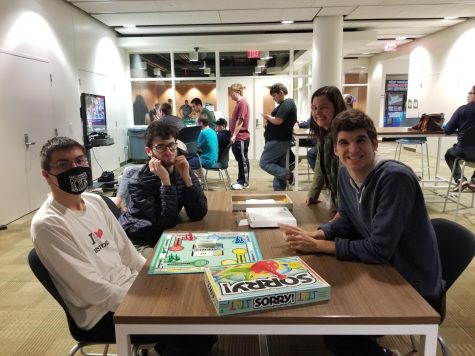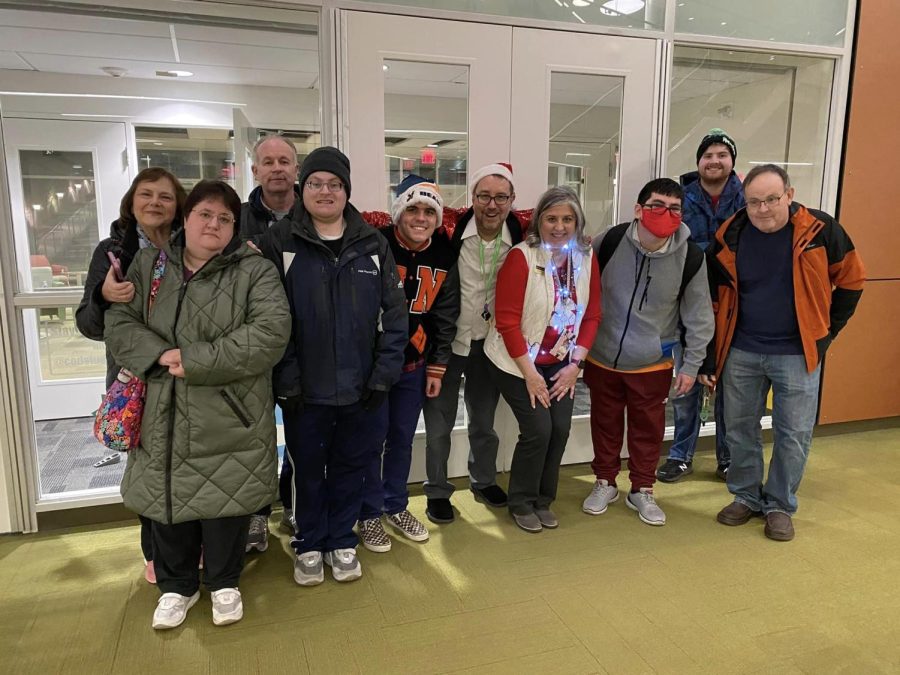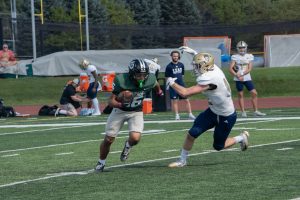The College Experience of Students with Autism
Three students shared their personal accounts of how they use academic services and social connections to make the best of their college years.
Autismerica’s 12th anniversary party in December 2022. Bobby Henry, Michael Duggan, Sheryl Ebersold, and PD Gamez stand at center. Photo provided by Autismerica
May 15, 2023
Editor’s Note: This story had been updated to correct information about the accommodations provided at COD and the process students may use to attain accommodations.
Beginning college can be particularly challenging for students with autism and other disabilities. For three current students with autism, finding a strong support system of peers and counselors, as well as academic accommodations, was important to achieve their goals and overcome stereotypes.
Sophomore student, Robert “Bobby” Henry, described himself as a very social person, who enjoys interacting with his peers as the president of Autismerica and a past leader in the New Student Orientation. Autismerica is a social club that serves students on the autism spectrum. Monthly meetings provide space to socialize and enjoy activities in a welcoming environment.
“Once you join, there’s a sense of joy that you belong to a group, a community of people,” Henry said. “When I’m around people who have the same disability as me, like being around PD (Pedro Gamez), it’s really helpful. I think we understand and trust each other. I’m so thankful that I have PD Gamez as my vice president; he’s really helpful and supportive of me.”
Gamez is vice president of Autismerica, which he has been part of since the fall of 2021. As the club officers, Gamez and Henry schedule the meeting activities and make sure new students feel welcome. Henry enjoys designing posters to promote Autismerica events.

One punctual attendee is Samuel Philippian, a sophomore pursuing environmental science, who rarely misses the Autismerica meetings.
“When I’m there, I just kind of feel free, and it helps to destress,” Philippian said. “We have a range of activities, Jenga bricks outside and indoors video games, and different board games. I’ve also gotten to show my friends digital artwork I’ve made in my free time for fun.”
With enjoyable activities like these, Autismerica helps to provide a welcoming social atmosphere for students with autism. There is also academic support from the club advisers, Michael Duggan and Sheryl Ebersold. Ebersold is also the accommodations specialist at College of DuPage.
Accommodations are changes made in the classroom to aid the learning experience of a student with a disability. These options are available to those who a disability, medical condition, injury or illness. Students can contact the Center for Access and Accommodations and fill out the online request form. Directly communicating with their professors about accommodations is important too, as Henry explained.
“After I get approved for the access and accommodation, I email my teachers, so they know I have a disability, which is autism, and I need help being taught the class instruction more easily,” he said. “I have a photographic memory, and I remember everything in pictures, not words. It would be easier for me if teachers explained with visual instructions, instead of written. I think maybe a picture would solve the problem.”
Philippian also mentioned specific accommodations he gets in class.
“I’ve also gotten accommodations for classes from Mrs. Ebersold. For instance, often when I watch a video or movie in class, it’s harder for me to figure out what’s going on when it doesn’t have subtitles,” Philippian added.
Gamez says he finds COD’s support systems for students with autism to be helpful, especially the life skills classes offered by Connections Transition Services. It is an organization rooted in the Naperville school system, which works with COD to help new students shift from high school to college. It offers social and emotional learning, vocational skills and independent living classes.
“There’s a class called COD Connect where we learn about skills we’d need at COD and general college life,” Gamez said. “We talk about study methods, taking notes, reviewing assignments, procrastination and things like that.”
Philippian started attending Connections when he enrolled at COD. He spoke about his appreciation for the case managers and counselors who aid his academic journey.
“The adults have been incredibly helpful for me. Mrs. South, my Connections teacher, helps me with my homework and with caring for my mind,” Philippian said.
Henry also has Mrs. South as his case manager in the COD Connect class.
“She really helps me manage my time between COD and Connections. I check in with her every time I need help on assignments or more time on homework,” Henry said.
Henry also described his recent graduation from his speech therapy classes at Connections.
“Speech therapy has become a good breakthrough in my life. I’ve learned how to communicate well. I now understand that people can reach out to me as I’m talking to them more,” Henry explained. “I learned how to become a friend to others, not just have friends listen only to you.”
Henry mentioned how people with disabilities like autism may be nonverbal and require speech therapy. Furthermore, he said it may be hard to follow social cues when communicating with others.
“It can be a big step, because most people who have a disability don’t really want to communicate and just be on their devices all the time,” Henry said. “But, I think if you approach a person with a disability, they can create a sense of friendship.”
He encouraged others with disabilities to feel comfortable with themselves when socializing with their peers. In his 3D Art class, he has made many friends while creating diorama projects together.
“I met a lot of amazing people in that class,” Henry said. “I just have a good feeling that I get to talk to them. I get to be around them more.”
They described how positive interaction with neurotypical peers counteracts stereotypes people have about autism. Philippian described how having autism shouldn’t automatically be seen as a bad thing or disadvantage.
“In some ways, it’s been kind of a gift. I’ve just been more free-thinking, more curious than a lot of other children and young adults, it seems,” Philippian explained. “At the same time, I also have trouble with focus and motivation, so it’s a mixed bag.”
Gamez mentioned how he used to worry that negative stereotypes of autism could affect people’s perceptions of him.
“After a while, when I was in my first year of college, I was less afraid,” Gamez said. “And if I felt like the fact that I have autism was relevant to a conversation, I would mention it without being afraid of mentioning it.”
As someone with ambitions of becoming a writer and director, Gamez is particularly attentive to how autistic people are portrayed in film and media. He mentioned the TV show, “Atypical,” which features a character on the autism spectrum. In one specific scene that made Gamez uncomfortable, the character says something inappropriate to make people laugh.
“We’re trying to make sure, like what are we laughing at, the joke or the character? But that’s where they messed it up,” Gamez explained. “They’re basically saying, ‘Haha, it’s something inappropriate, but it’s OK because he’s autistic. He doesn’t know what he’s doing.’”
Gamez described how it is patronizing to use people with autism as comedy or portrayals of overdone behavioral quirks. He hopes that autistic representation will go beyond the character’s disability and include aspects of their identity and personal accomplishments. With the goal of directing his own films, Gamez took classes in Benedictine University’s Writing and Publishing major. With the constructive education tools he utilized at COD, he has been working hard to achieve these dreams. He hopes people see having autism has not been a barrier to doing so.
“To my peers who have autism, we are more than a stereotype, because I’ve looked at my own achievements,” Gamez said. “Think about what you can do, what you’re capable of. Don’t let these stereotypes hinder you from following your dreams or attending to your duties.”
His words reflect on the experiences of various autistic students who continually follow their dreams, while in college and after graduating.
When asked about his experiences with autistic students, Michael Duggan, long-time adviser of Autismerica, reflected on the accomplishments of alumni through the 12 years of the club’s existence.
“We’ve also seen former students move onto amazing jobs, start families, and much more. It’s incredibly fulfilling. They stay in touch with us and share their accomplishments,” Duggan said. “I don’t think I would change much given all these great outcomes, but your question does remind me to celebrate student accomplishments more and more. Their enthusiasm and energy keep us going.”
For incoming students who may be on the autism spectrum or have a disability, visit the Center for Access and Accommodations and check out the Autismerica meeting schedule on the COD website.




















